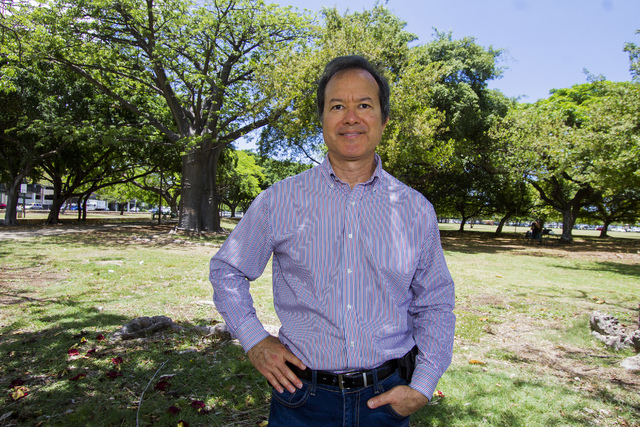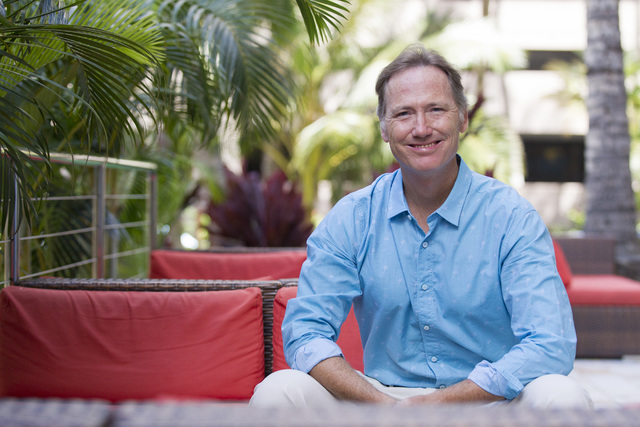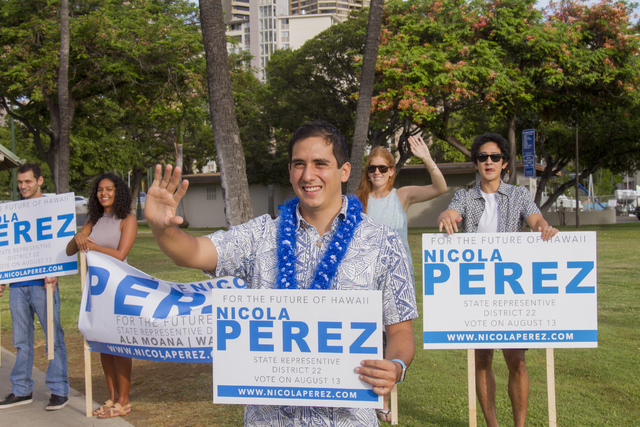Homelessness is a main issue for candidates

DENNIS ODA / DODA@STARADVERTISER.COM
Tom Brower, shown above, Dennis Miller and Nicola Perez-Garreaud are vying for the Democratic nomination in state House District 22, which encompasses Waikiki, parts of Kakaako and Ala Moana.

CINDY ELLEN RUSSELL/CRUSSELL@STARADVERTISER.COM
Dennis Miller is challenging Rep. Tom Brower in the Dist. 22 primary for Waikiki and Kakaako. Miller is pictured at the Courtyard by Marriot Waikiki Beach Hotel where he his business “Spa Pure” is located.

DENNIS ODA / DODA@STARADVERTISER.COM
Nicola Perez and his supporters are sign waving at the entrance of Ala Moana Park on the corner of Ala Moana Blvd and Atkinson. He is running for the House in District 22.



Coping with ongoing issues tied to homelessness in the state’s tourism hub is a primary focus of a three-way Democratic primary for the District 22 House seat, which includes Waikiki and Kakaako.
Nearly six years ago incumbent state Rep. Tom Brower, 51, published a brief manifesto on homelessness that argued government must “remove the homeless from areas of aesthetic, cultural and economic importance for the enjoyment of residents and visitors.”
Brower suggested the government should provide shelter to Hawaii’s homeless residents just as it would if people lost their homes in a hurricane or some other natural disaster, but warned the government would never be able to build enough shelters to house all the homeless.
His proposal, House Resolution 62, called on the Hawaii Public Housing Authority to establish “homeless safe zones” in which homeless individuals could legally camp and use a restroom, with the zones operated by nonprofit agencies.
“We can either designate areas where the homeless can be, or do nothing and let them continue to be everywhere,” Brower wrote. “If enough safe zones are created, the homeless cannot say they have ‘no place to go’ and continue monopolizing our parks and sidewalks. They will now have a place to go.”
Brower still advocates for “safe zones,” which don’t yet exist. Maintaining that government must enforce laws to clear sidewalks and parks, he envisions the zones as a place for the homeless to go until they can be placed in more permanent housing.
Don't miss out on what's happening!
Stay in touch with breaking news, as it happens, conveniently in your email inbox. It's FREE!
“It’s the only realistic way right now,” he said. “I think if you told anyone in anyone’s neighborhood, ‘We need to allow people to camp in a small portion of your neighborhood, but we promise to keep them out of everywhere else,’ I think people would understand that because we’re at a point right now where camping is rampant everywhere and there’s no rules, and the rules that we do have aren’t being enforced.”
Born in Hawaii and raised on the New Jersey shore, Brower moved back to the islands in 1983 to live in Waikiki. He graduated with a bachelor’s degree in journalism from the University of Hawaii at Manoa, and for almost a decade worked at a number of radio stations, including KPOI and KSSK. Brower is now a full-time lawmaker, wrapping up his fifth two-year term representing the area.
Homelessness remains the most common complaint from constituents in the district, but Brower said the homeless situation has improved in Waikiki. That is in large part because of the city’s enforcement of a sit-lie ban in public places and an ordinance to remove people’s property from public areas. However, Brower said, the problem is still “bad” in surrounding areas.
He said his own sometimes controversial efforts to address the problem were helpful because they drew attention to the issue.
In November 2013 he launched his own campaign to remove or destroy shopping carts that were abandoned by the homeless in his district, using a sledgehammer to pulverize the carts.
And last summer he was attacked and beaten in a Kakaako homeless encampment of nearly 300 people, an incident that helped attract intense political and media attention to the homeless issue. Residents of the camp claimed Brower was attacked after he refused their request to stop photographing them. Brower denies that, contending he had already put his camera away when he was assaulted.
Brower’s sledgehammer tactics triggered a scalding, viral social media response from thousands of critics, in part because of a post that noted he was wearing a designer-name hat while wielding his sledgehammer to dispose of shopping carts. At the time, a Facebook page was launched to promote a “Campaign to Prevent the Reelection of Tom Brower,” and the page is occasionally still active.
“It was a flashpoint, but I think it did a lot to move the conversation forward,” Brower said. “If my name has to be dragged through the mud in order to get the government to do what it needs (to do) to clean up the neighborhood, then that was a price I was willing to pay.”
He added, “I think that more legislators need to get their hands dirty to solve these issues, and that’s in part why I go to Kakaako.”
Brower is being challenged in the Aug. 13 Democratic primary by Nicola Perez-Garreaud, who is a server at Duke’s Waikiki restaurant, and by Dennis Miller, a yoga instructor and owner of a massage business.
First political venture
Miller, 48, spent much of this year organizing sign-waving and other activities for the Bernie Sanders presidential campaign, which was his first venture into politics. The experience taught him the mechanics of campaigning and offered him an opportunity to connect with people, he said.
He asserts that the Democratic Party is “totally corrupt” and that “election fraud” robbed Sanders of the presidential nomination, but disapproves of activists who are abandoning the party over the issue.
“I think they’re just acting like kids,” said Miller, who is a 26-year resident of Hawaii. “You have this big, corrupt party. Participate with it and be a part of fixing it. So, that’s what I’m doing.”
Miller said there are good people in the party, and he is optimistic that Democrats can do good things for people at the local level. He said the rallying cry for the party should be developing a single-payer health care system, which is sometimes described as “Medicare for all” by the national organizations that have been lobbying for it.
This would be a state-funded program financed through a 6 percent payroll tax levied on all residents, Miller said. He said the details still need to be worked out with doctors and that many dislike Medicare because it is complex and pays less for health care than private insurance. That system must be simplified, he said.
“That 6 percent is less than what you would pay now for (insurance), so we are saving people money and simplifying lives,” he said. “It costs less, it increases access to health care. Why not?”
Miller said society has a moral obligation to house the homeless, adding that other cities such as Salt Lake City have solved their homeless problem. He supports the “Housing First” model of placing people in housing and then working to address other problems they might have such as drug addiction or mental illness.
As for the city’s sit-lie ban to move the homeless out of public spaces, “in a way it was necessary; however, it’s an incomplete solution … because just sweeping them away doesn’t solve the problem,” he said.
Insight into tourism
Also in the race is Democrat Nicola Perez-Garreaud, 22, who graduated last year with a bachelor’s degree in historical and political studies from Chaminade University. Campaigning as Nicola Perez, he said he first sampled Hawaii politics as a volunteer on Stanley Chang’s unsuccessful campaign in 2014 to serve on Hawaii’s congressional delegation.
Perez moved to Maui with his family from Lima, Peru, when he was a child, graduated from Maui High School and has lived in Waikiki for his four years of college. His work at Duke’s Waikiki has given him insight into the tourism industry, he said.
The guests at Duke’s bring up the issue of homelessness every day, “and it is affecting our community and the way they see Hawaii,” Perez said.
Homeless shelters in Hawaii are generally not filled to capacity, and the state should focus on supporting existing shelters rather than creating new ones, he said. Perez also contends the government should attack the affordable-housing shortage in the same way it is approaching the Honolulu rail transit project.
“They’re putting their effort to build rail and kind of putting everything else on the back burner,” Perez said. “If we tackled affordable housing the same way that we tackled rail, it would get done so much faster, so much more efficiently.”
For Perez the most important issue in the campaign is climate change and the environment, and he contends the state should extend its marine protection zones to give more of the state’s ailing coral reefs and other aquatic life a chance to recover.
He also believes the hotels built along the Waikiki shoreline should be required to contribute money to help finance programs for environmental protection and reef recovery in the area.
“The environment is the greatest challenge to the world,” Perez said, adding that he sees strong connections between the environment and other leading state issues. For example, he wants to do more to educate youth about the environment, and wants to provide affordable housing for the homeless “so that they’re not on the street and polluting our environment.”
The winner of the Democratic primary will face Republican Kathryn Henski in the general election.
19 responses to “Homelessness is a main issue for candidates”
Leave a Reply
You must be logged in to post a comment.







As for Kathryn Henski she even ran a homeless shelter in Alaska. See her WEB site
electkathrynhenski.com
Half the population in third world countries lives as wretched like the homeless already. Population growth does it. Keep multiplying especially if you are poor already.
All these candidates talk a big game on the homeless problem, but once elected NOTHING. If all candidates prior to this election had a solution, there wouldn’t be a homeless problem.
Have you checked out the other candidate??
WEB site electkathrynhenski.com
Brower said “government must ‘remove the homeless from areas of aesthetic, cultural and economic importance for the enjoyment of residents and visitors.'” — in other words, keep the homeless away from Brower’s rich neighborhoods, and shuffle them off to Waianae and Kalihi and let their working class neighborhoods become the homeless dumping grounds. The sad thing is, the Governor and Mayor (who also live in wealthy neighborhoods) will do exactly that. Hawaii will become like Rio, with rich foreigners and tourists along the beaches, and shanty slums for the rest.
Well, one has to recognize that tourism is probably the biggest moneymaker in Hawaii. Even the construction industry would suffer if mainland people and foreigners stopped coming to Hawaii. Protecting major resources is paramount.
Miller: “…6 percent payroll tax levied on all residents.” Tax and spend Democrat. The total package of goods and services GIVEN to those on government assistance is equivalent to the salary of a middle income person. Why don’t we teach them how to be self-reliant like the rest of us instead of pampering them with hard working people’s earnings.
The safe zones sounds like a decent idea. It takes away the excuse of nowhere to go. And I agree, why should all residents be forced to pony up because our government wants to keep giving. What could they have done with the 8 billion wasted on a train to nowhere.
Tom Brower is another bad rash that should just go away.
We have no laws do deal efficiently with homelessness, other than throwing money at them. So they will just multiply. Favelas like in Brasil will pop up and ruin our society. Dictating birth control and labor would help.
Brower aka “SledgeHammer’.
What a piece of work. Destroy and conquer those shopping carts.
This beady eyed creep thinks he’s some kind of hero. Unbelievable. Cant stand the guy.
I didn’t recognize him without the bumps and bruises he so proudly wore.
Every politician is concerned about the HOMELESS, because thats votes, after all the election crap, the HOMELESS is forggotten until the next 4 fours,. Politicians are full of it just like the clintons.
Not convinced. These candidates are not doing a thing unless they stop the flow. Otherwise, its not going to matter where you offer to house them.
Well, both Nicola and Miller are out. You can’t have zero experience or bad mouth the Democrats.
but are they all cancer free?
There is NO end to homelessness. All a politician can do is kick the can down the road. The more you provide, the more they will come. In time it will overwhelm the tax system. Don’t feed the animals.
Kathryn Henski got the homeless in line when she was in Alaska. See her WEB site — electkathrynhenski.com